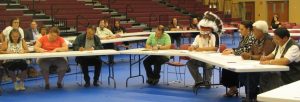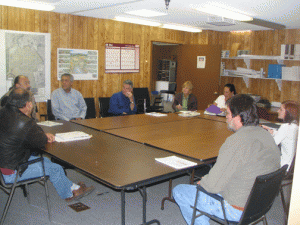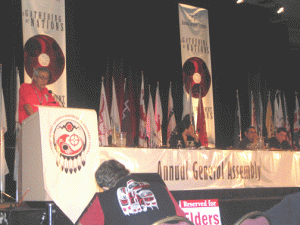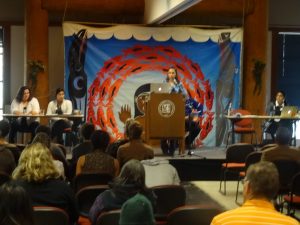The Climate Change and Pacific Rim Indigenous Nations Project was initiated at The Evergreen State College (Olympia, Wash.) in 2006. Its purpose is to document the existing effects of climate change on Indigenous peoples and their homelands in Pacific Rim countries, to describe Indigenous nation responses to fossil fuels and their effects from the local to the international levels, and recommend future paths for Indigenous nations to respond to the climate crisis. Its climate change work has focused on U.S. tribal nations in the Pacific Basin states, Native Alaskans, First Nations in Western Canada, and Māori in Aotearoa New Zealand.

The Project was originally initiated by Evergreen’s Northwest Indian Applied Research Institute (NIARI) to support the development of an Indigenous nation-to-nation Pacific Rim treaty agreement, signed in 2007 in the Lummi Nation by Indigenous government representatives from the U.S., Alaska, Canada, Australia and Aotearoa New Zealand. The United League of Indigenous Nations Treaty served as a structure to address major issues and challenges that are common to the nations including joint action plans that address the impacts of climate change.

Evergreen faculty Alan Parker (NIARI Director) and Zoltán Grossman worked with graduate students in their Master of Public Administration-Tribal Governance program to compile the research for the 2006 NIARI report Climate Change and Pacific Rim Indigenous Nations: A Report to the Leadership of Indigenous Nations. They were joined by Tulalip Tribes natural resource staff Terry Williams and Preston Hardison, Maori environmental scientist Ata Brett Stephenson (faculty at the Maori university Te Whare Wānanga o Awanuiārangi). In the 81-page report, Dr. Parker offered key recommendations to Indigenous nation leadership on possible strategies to confront, mitigate or adapt to the impacts of climate change. His recommendations were included in the 2010 community organizing booklet Northwest Tribes: Meeting the Challenge of Climate Change edited by NIARI research associate Debra McNutt (see Book and Publications):
1. Educate tribal membership on the present and future effects of climate change on their own homelands.
2. Secure sources of fresh water now to meet future needs of tribal communities located in drought-impacted areas.
3. Secure a future source of food stocks, long-term storage capacity and production capabilities for crops that can adapt to climate change.
4. Prepare for impacts on culturally significant food and animal species.
5. Develop relationships with neighboring governments and communities regarding land use planning, and emergency plans for the more disastrous impacts of climate change.
6. Consider alliances with local governments to build renewable energy capacity.
7. Consider strategies to unite tribes around habitat protection.
8. Get actively involved as sovereign governments in U.N. climate change negotiations, and pressuring national governments to reduce emissions.
9. Get youth involved in cultural education, and defending the future of their nation from harmful climate change.
10. Work with other Indigenous nations in a treaty relationship transcending colonial boundaries.

A Powerpoint summary (17 MB) on the Climate Change and Pacific Rim Indigenous Nations Project has been presented at several regional or national tribal climate change conferences, as well as the Assembly of First Nations, National Congress of American Indians, and a TEDx talk. Articles by Zoltán Grossman on Indigenous nations’ responses to climate change were published in the American Indian Culture & Research Journal and Terrain.
Since NIARI closed in 2012, the Project has documented Native nations’ opposition to fossil fuel extraction and shipping, whether in Pacific Northwest port terminals (such as near the Quinault Nation), or Aotearoa New Zealand. The Project has sponsored Indigenous Climate Justice Symposiums in 2015 and 2017 at the Evergreen Longhouse, and a 2017 Northwest Indigenous Youth Day with the Nisqually Tribe.
Several of Evergreen’s Native Programs and Sustainability and Justice programs have included Indigenous nations’ responses to the climate crisis. Shangrila Joshi Wynn, Karen Gaul, Kristina Ackley, Zoltán Grossman, and Frances Rains have been among the Evergreen faculty members planning the Symposia, and Tribal MPA grad Debra McNutt. As a state institution, Evergreen has a continuing responsibility and obligation to engage and consult with Washington tribal nations in our educational work, in keeping with the 1989 Centennial Accord and 1999 New Millennium Agreement.

